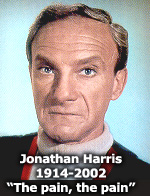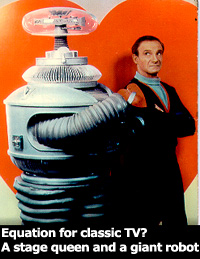|
|
| |
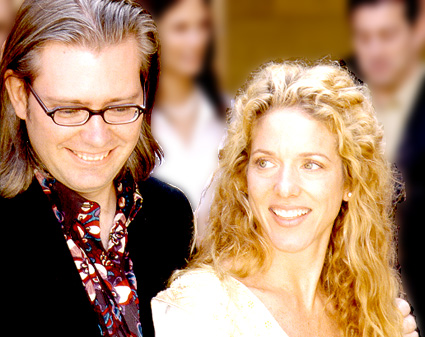 |
| PROGRAMMING GENIUS WEDS TRIATHLETE
STARLET
SUPER-COUPLE CELEBRATE VOWS
AT THE EGYPTIAN THEATRE
|
MOVING SERVICE PEFORMED BY
NOIR PREACHER-MAN EDDIE MULLER
GUESTS INCLUDE ALL-TIME GREATS
ANN SAVAGE, ANDRE DE TOTH,
DICK FLEISCHER, VAL GUEST,
MONTE HELLMAN, WERNER HERZOG
L.A. LEGEND THAI ELVIS SINGS
"BLUE HAWAII" FOR THE NEWLYWEDS
|
|
SPECIAL TO FIVE-O
Grauman's Egyptian Theatre - that's where the Hollywood red
carpet premiere was born in 1922. But this 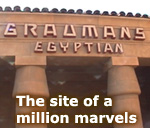 time
the special engagement wasn't for an evening. It was for life,
as American Cinematheque programmer Dennis Bartok married
producer Susan Gold in a creative, unconventional ceremony
that captured the couple's unique, heart-felt chemistry. time
the special engagement wasn't for an evening. It was for life,
as American Cinematheque programmer Dennis Bartok married
producer Susan Gold in a creative, unconventional ceremony
that captured the couple's unique, heart-felt chemistry.
He's the laid-back mastermind whose know-how gives Los Angeles
a cinematheque to rival Paris, Barcelona and Moscow. She's
the ray of golden light whose professional talent as a  producer
is matched only by her prowess in Iron Man triathlons and
yoga performed at 105 degrees. producer
is matched only by her prowess in Iron Man triathlons and
yoga performed at 105 degrees.
Relations imported from the mighty Midwest made an attractive
mix with the bride and groom's down-home L.A. loyalists. Here's
the full account by social reporter Lisette Diamond-Nimitz:
|
|
SUSAN GOLD AND DENNIS BARTOK
MARRIED SEPTEMBER 15TH 2002
EGYPTIAN THEATRE
HOLLYWOOD, CALIFORNIA
"to love and be loved forever"
The Gold-Bartok wedding was a smashing Hollywood event! Who
would guess the chance meeting of these two would lead to
marriage when Dennis and his friend PJ crashed Susan's birthday
party at Bar Marmont on West Hollywood's Sunset  Strip?
As Dennis entered the restaurant a glimmer of light caught
his eye. There was Susan wearing a princess tiara. But Dennis,
a self-described old movie nerd, did not impress Susan, who Strip?
As Dennis entered the restaurant a glimmer of light caught
his eye. There was Susan wearing a princess tiara. But Dennis,
a self-described old movie nerd, did not impress Susan, who
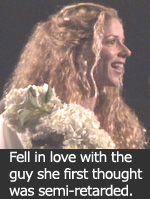 thought
he was a Hollywood hipster and definitely not her type. Not
her type, that is, until she got him to give an interview
for AMC, the cable channel where she worked. Then the tide
changed. thought
he was a Hollywood hipster and definitely not her type. Not
her type, that is, until she got him to give an interview
for AMC, the cable channel where she worked. Then the tide
changed.
On her wedding day Susan looked every bit the Botticelli
goddess with her  golden
curls. She wore a graceful long silk lehnga and top with gold
embroidery and over-the-shoulder train. Her wedding dress
was the creation of her friend, designer Denise Wingate. Susan
also carried a bouquet of white hydrangeas. golden
curls. She wore a graceful long silk lehnga and top with gold
embroidery and over-the-shoulder train. Her wedding dress
was the creation of her friend, designer Denise Wingate. Susan
also carried a bouquet of white hydrangeas.
Eddie Muller, San Francisco author and leading authority
on Film Noir, conducted the ceremony. Erin Berkowitz 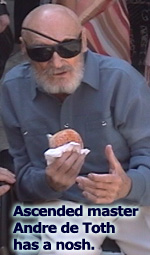 sang
"Fields of Gold" a cappella. The matchmaker Melissa
Smith read a poem and caught the bouquet. Concert violinist
Brooke Wharton played Ravel's "Pavanne for a Dead Princess."
During the ceremony Susan remembered: Terri Parris her college
friend; her grandparents Fredrick Arthur Grosse and Nancy
Dootile Grosse; Alexander Joseph and Ida Nemeth Berkes; and
her dog Robey. Dennis remembered his mother Leann sang
"Fields of Gold" a cappella. The matchmaker Melissa
Smith read a poem and caught the bouquet. Concert violinist
Brooke Wharton played Ravel's "Pavanne for a Dead Princess."
During the ceremony Susan remembered: Terri Parris her college
friend; her grandparents Fredrick Arthur Grosse and Nancy
Dootile Grosse; Alexander Joseph and Ida Nemeth Berkes; and
her dog Robey. Dennis remembered his mother Leann  Bartok
and his grandparents Margaret and Joseph Bartok. He gave a
special thanks to Budd and Mary Boetticher and Joe Massot.
The wedding vows, spoken with warmth and passion, were written
by the bride and groom for each other. Eddie Muller, having
received his marrying credential over the Internet, pronounced
the couple husband and wife. Bartok
and his grandparents Margaret and Joseph Bartok. He gave a
special thanks to Budd and Mary Boetticher and Joe Massot.
The wedding vows, spoken with warmth and passion, were written
by the bride and groom for each other. Eddie Muller, having
received his marrying credential over the Internet, pronounced
the couple husband and wife.
The reception held in the courtyard of the Egyptian Theatre
included a stand-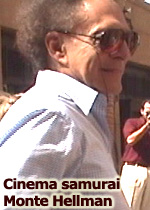 up
lunch. The beautiful decorations of hydrangeas and pomegranates
were well matched by the colorful slip dresses worn by many
of the ladies present. Also attending were a few dogs and
babies keeping the celebration lively. It must not be forgotten
that Thai Elvis made a surprise appearance, singing three up
lunch. The beautiful decorations of hydrangeas and pomegranates
were well matched by the colorful slip dresses worn by many
of the ladies present. Also attending were a few dogs and
babies keeping the celebration lively. It must not be forgotten
that Thai Elvis made a surprise appearance, singing three
 selections
from the film "Blue Hawaii." And following the reception
a special screening of Richard Fleischer's uplifting family
film "The Happy Time" (1952) was presented. selections
from the film "Blue Hawaii." And following the reception
a special screening of Richard Fleischer's uplifting family
film "The Happy Time" (1952) was presented.
Many notable guests were present, including: the families
of Susan and Dennis, Mary Boetticher, actress Marsha Hunt
("The Happy Time"), noir 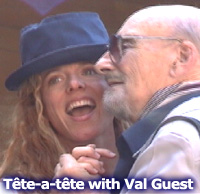 celebrity
Ann Savage, world record swimmer Bob Strand, world class duathlete
Gerard Degan, and the new "Terminator" girl, Kristanna
Loken. Also present were: Max Rosenberg, producer of "Dr.
Terror's House of Horrors," distributor Harry Novak ("Mantis
in Lace"), actors Frederic Forrest ("Apocalypse
Now") and Nicky Katt ("Boston Public"), cinematographer celebrity
Ann Savage, world record swimmer Bob Strand, world class duathlete
Gerard Degan, and the new "Terminator" girl, Kristanna
Loken. Also present were: Max Rosenberg, producer of "Dr.
Terror's House of Horrors," distributor Harry Novak ("Mantis
in Lace"), actors Frederic Forrest ("Apocalypse
Now") and Nicky Katt ("Boston Public"), cinematographer
 Patrick
Steward, and film critic Leonard Maltin. A distinguished list
of directors was in force at this wedding, including Richard
Fleisher, Werner Herzog, Curtis Harrington, Monte Hellman,
Joe Dante, Adam Rifkin and Val Guest. Patrick
Steward, and film critic Leonard Maltin. A distinguished list
of directors was in force at this wedding, including Richard
Fleisher, Werner Herzog, Curtis Harrington, Monte Hellman,
Joe Dante, Adam Rifkin and Val Guest.
Susan is a triathlete and producer. Dennis is a screenplay
writer and runs programming for the American Cinematheque.
|
|
Let's shift gears now, from wedding observances to honoring
and remembering, as CINEMA FIVE-O continues with this -
|
|
Farewell To Andre
We're deeply saddened by the recent death of director Andre
de Toth, a longtime friend of the American Cinematheque and
a member of the Board of Trustees, who passed away at  his
home in Burbank on Sunday, October 27th - just a few blocks
from Warner Bros. Studios, where Andre made some of his best
known films, including HOUSE OF WAX, SPRINGFIELD RIFLE and
CRIMEWAVE (and where Andre's his
home in Burbank on Sunday, October 27th - just a few blocks
from Warner Bros. Studios, where Andre made some of his best
known films, including HOUSE OF WAX, SPRINGFIELD RIFLE and
CRIMEWAVE (and where Andre's 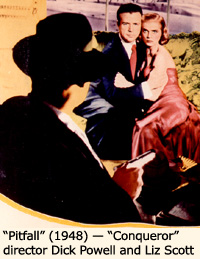 wife
Ann worked for many years as Executive Assistant to former
Warner Bros.' CEO Robert Daley.) wife
Ann worked for many years as Executive Assistant to former
Warner Bros.' CEO Robert Daley.)
In the land of the blind the one-eyed man is king, goes the
old saying - and Andre was a very special kind of royalty,
a Hungarian genius of the old school who cut his cinematic
eye-teeth with the Kordas in the late 1930s and early 1940s
working on THE JUNGLE BOOK and THE THIEF OF BAGDAD, before
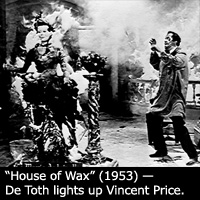 immigrating
to the U.S., where he kick-started his career by directing
one of the first (and most prescient) movies about the menace
of Nazism, NONE SHALL ESCAPE in 1944. To the end of his life
Andre was immensely proud of the fact that he had sounded
the alarm bells about the Nazi death camps before almost anyone
else in Hollywood. immigrating
to the U.S., where he kick-started his career by directing
one of the first (and most prescient) movies about the menace
of Nazism, NONE SHALL ESCAPE in 1944. To the end of his life
Andre was immensely proud of the fact that he had sounded
the alarm bells about the Nazi death camps before almost anyone
else in Hollywood.
In an industry known as much for compromise as for achievement,
Andre was one of the rare few who really stuck to his guns
- he continually made films about dark, disturbing subjects
such as adultery (PITFALL), 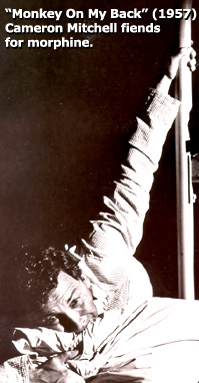 drug
addiction (MONKEY ON MY BACK), spiritual and physical violence
(DAY OF THE OUTLAW), the sheer insanity of war (PLAY DIRTY),
without ever talking down to his audience, or attempting to
sugarcoat the painful reality of the subject at hand. drug
addiction (MONKEY ON MY BACK), spiritual and physical violence
(DAY OF THE OUTLAW), the sheer insanity of war (PLAY DIRTY),
without ever talking down to his audience, or attempting to
sugarcoat the painful reality of the subject at hand.
In person and on film, Andre was direct, honest, and to the
point - his one good eye acted as a powerful and inescapable
lens, focusing on the raw, emotional truth of the story. Put
The Drama In Front Of The Camera was a favorite saying of
Andre's, one he firmly believed in.
Andre also had a wicked and mischievous sense of humor -
he pulled me aside once, just before the beginning of a post-screening
discussion of one his films, and whispered in my  ear,
"Remember, whatever I say, I'm your friend." It
was that sense of humor, coupled with a natural camera-eye
and his pared-to-the-bone instincts, that earned him the admiration
of directors like Martin Scorsese, Bertrand Tavernier and
Curtis Hanson, film scholars like Todd McCarthy and Anthony
Slide (who co-authored Andre's wonderful book "De Toth
On De Toth"), and film programmers like Andre's dear
friend Thierry Fremaux of the Institut Lumiere in Lyons, France. ear,
"Remember, whatever I say, I'm your friend." It
was that sense of humor, coupled with a natural camera-eye
and his pared-to-the-bone instincts, that earned him the admiration
of directors like Martin Scorsese, Bertrand Tavernier and
Curtis Hanson, film scholars like Todd McCarthy and Anthony
Slide (who co-authored Andre's wonderful book "De Toth
On De Toth"), and film programmers like Andre's dear
friend Thierry Fremaux of the Institut Lumiere in Lyons, France.
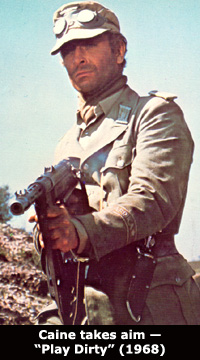 For
those who love movies, Andre was the real thing, a director's
director, the last of a rare breed of Old World craftsmen
and artists. For
those who love movies, Andre was the real thing, a director's
director, the last of a rare breed of Old World craftsmen
and artists.
To the end of his life, Andre enjoyed nothing better than
having a cup of coffee at his favorite café, Priscilla's,
in Burbank; he insisted on sitting outside, where he could
enjoy the fresh air, hear other people talking, dreaming,
arguing about the movies. I think it reminded him of his days
growing up in Hungary, the cafes and coffee-shops in Budapest
before the war.
Dennis Bartok, American Cinematheque
|
"Killing is ridiculous; nature takes care of death. We
don't have to help it."
- Andre de Toth
I can only add one favorite Andre moment: after an awe-striking
screening of 1940's "Jungle Book" (an original 35mm
IB Technicolor Dye-Transfer print - still the best and truest
color I've yet seen on film), de Toth was rolled to the foot
of the screen, where, clearly fired up from having revisited
this cinematic high point, he declared, "It was sixty
years ago we made dat ting!"
So while we're gathered here to celebrate the caliber of film-making
represented by Andre de Toth, let's review a few highlights
from the last year in programming, courtesy of American Cinematheque
director Barbara Smith and her hard-working staff, including
Dennis, Gwen Deglise, Chris D., Margot Gerber, Mary MacElwain,
Andrew Crane, Nancy Winters, Kurt Marhon, David Shultz, Bill
Foster, James Bellos, and at the Egyptian Theatre: Monica, Ross,
Barry, Christina, Noel, Estee, Mutsuko, Sidi, Ned and lead projectionist
Paul Rayton. Cheers. |
 |
|
CINEMATHEQUE REVUE 2002-03
IN PRAISE OF
"Over The Edge" (1979)
Perfect case in point. This is a screening that demonstrates
exactly why good Cinematheque programming is the antidote
for over-produced mediocrity. Why bother with  what
you're supposed to be lining up for when you could have cult
films, films with their own unique legend - and check out
the incredible web of associations on this bad boy. The warning
came to me in the form of an email from Cisco, the Laurel
Canyon Kid: what
you're supposed to be lining up for when you could have cult
films, films with their own unique legend - and check out
the incredible web of associations on this bad boy. The warning
came to me in the form of an email from Cisco, the Laurel
Canyon Kid:
"Subject: Yes, it is that thing, that
wonderful thing.
"Flash! Alyse, Felicia, and Cisco will
all be attending 'Over the Edge' at 4 pm -- one of the finest
films of the '70s, and one of the best teenager movies of
all time and one of the 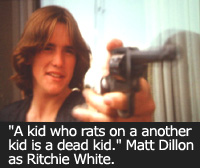 best
soundtracks of all time. Featuring lanky junior high school
stoners who look like real lanky junior high school stoners.
Excellent cinematography. Great Cheap Trick/Van Halen soundtrack.
Corrupt parents, adults, and community leaders (including
"Officer Doberman"). Weed ("420") aplenty.
And a junior high school burning to the ground like Post Toasties. best
soundtracks of all time. Featuring lanky junior high school
stoners who look like real lanky junior high school stoners.
Excellent cinematography. Great Cheap Trick/Van Halen soundtrack.
Corrupt parents, adults, and community leaders (including
"Officer Doberman"). Weed ("420") aplenty.
And a junior high school burning to the ground like Post Toasties.
"Four stars. Or... "420" stars.
"See you Sunday, Imperator. -Cisco"
To concur with Cisco, "Over the Edge" is up there
with "Payday" and "Rolling Thunder" -
one of the best movies of the '70s and the feature debut for
13 year-old Matt Dillon as babyface outlaw Ritchie White.
So who better than Matt Dillon (this was his tribute series)
to appear in person at the Egyptian with his friend Tim Hunter,
writer of "Over the Edge" and later Dillon's director
in "Tex" and "The Fort of Saint Washington."
Where else can you get an in-person as righteous as that?
Actually, we know the answer: it's Cinematheque again, awarded
the silver medal for last year's "Fast Times at Ridgemont
High" screening with  Jennifer
Jason Leigh and VIP novelist Hubert Selby, Jr. in person ("Last
Exit to Brooklyn" screened after the Q&A). And of
course Cinematheque gets the bronze too. Let's just pick one:
OK, Gloria Stuart, 92 sparkling years young, in person with
two of her best, "The Invisible Man" (1933) and
"The Old Dark House" (1932). Jennifer
Jason Leigh and VIP novelist Hubert Selby, Jr. in person ("Last
Exit to Brooklyn" screened after the Q&A). And of
course Cinematheque gets the bronze too. Let's just pick one:
OK, Gloria Stuart, 92 sparkling years young, in person with
two of her best, "The Invisible Man" (1933) and
"The Old Dark House" (1932).
So what's with this "Over the Edge" movie, exactly?
Basically, it's a cousin of the juvenile delinquent exploitation
film. The only difference is it's artistically ingenious.
The picture is directed by '70s ace Jonathan Kaplan. Don't
be surprised if he knows what a good performance is all about
he's the nephew of Van Heflin, top-flight star of Noir
Fest hits "The Prowler" (1950) and "Act of
Violence" (1948). Van Heflin is like Edmond O'Brien,
the top of the game in screen acting. You also saw him in
Woody Allen's all-time #1 picture, "Shane" (1953).
The director's father, blacklisted composer Sol Kaplan, is
well known for "Star Trek" themes he did in the
'60s, as well as composing great scores for  Noir
Fest faves "The Burglar" (1958) with Dan Duryea
and Jayne Mansfield, AND Joe Newman's immortal noir classic
starring Edmond O'Brien, "711 Ocean Drive" (1950).
Fans of Marilyn Monroe's first runaway hit, "Niagara"
(1953), will also recognize Kaplan's lush swells. Noir
Fest faves "The Burglar" (1958) with Dan Duryea
and Jayne Mansfield, AND Joe Newman's immortal noir classic
starring Edmond O'Brien, "711 Ocean Drive" (1950).
Fans of Marilyn Monroe's first runaway hit, "Niagara"
(1953), will also recognize Kaplan's lush swells.
Sol Kaplan's first film score credit is for "Tales of
Manhattan" (1942), an all-star musical affair with Charles
Boyer, Rita Hayworth, Ginger Rogers, Henry Fonda, Charles
Laughton, Edward G. Robinson, Paul Robeson and Ethel Waters.
At the other end of the rainbow you'll find "Over the
Edge" - featuring a cast of unknowns drawn from Colorado
reform schools. Sol Kaplan's last score is one of his best,
and definitely one of the best ever to land in a "youth
movie." That's because its modernist orchestral themes
are interwoven as emotional counterpoint to the on-the-edge
rock outbursts of Cheap Trick, Ramones, Kiss, AC/DC and Van
Halen.
As a youth Jonathan did some stage acting and was directed
by Elia Kazan - his sister and mother are both actors as well.
Kaplan studied with  Scorsese
at NYU and got his start in features with a Roger Corman number
called "Night Call Nurses" (1972). He then directed
two popular hits on either side of the color line: Isaac Hayes
as "Truck Turner" (1974) and Jan Michael Vincent
in "White Line Fever" (1975). Scorsese
at NYU and got his start in features with a Roger Corman number
called "Night Call Nurses" (1972). He then directed
two popular hits on either side of the color line: Isaac Hayes
as "Truck Turner" (1974) and Jan Michael Vincent
in "White Line Fever" (1975).
Kaplan directed drag-race drama "Heart Like A Wheel"
(1983) and is most highly regarded for "The Accused"
(1980), starring Jody Foster, the most significant film about
rape since "Something Wild" (1961), produced and
starring Carroll Baker, and "Outrage" (1950), written
by Malvin Wald and directed by Ida Lupino (sorry, "The
Conqueror" is disqualified). And then there's genre-specific
crowd-pleasers like "Bad Girls" and "Unlawful
Entry," in keeping with Kaplan's diploma from Corman
U.
By the way, scripter Tim Hunter's father was also a blacklist
VIP, one who counted Ring Lardner Jr. as a co-writer. And
in another parallel, it  seems
Ian McLellan Hunter wrote "The Amazing Mr. X" a.k.a.
"The Spiritualist" (1948), which brought down the
house a couple years ago at Noir Fest with Turhan Bey in person.
As for Tim's mother, Aileen, she wrote "Christmas in
Connecticut," starring Barbara Stanwyck. And "River's
Edge," the film regarded as Tim Hunter's masterpiece,
launched Keanu Reeves, Ione Skye and Crispin Glover in 1986. seems
Ian McLellan Hunter wrote "The Amazing Mr. X" a.k.a.
"The Spiritualist" (1948), which brought down the
house a couple years ago at Noir Fest with Turhan Bey in person.
As for Tim's mother, Aileen, she wrote "Christmas in
Connecticut," starring Barbara Stanwyck. And "River's
Edge," the film regarded as Tim Hunter's masterpiece,
launched Keanu Reeves, Ione Skye and Crispin Glover in 1986.
In the mid-'70s Hunter penned "Over the Edge" with
his student Charlie Haas. The script originated from a story
they saw in the paper, reporting vandalism sprees by teens
in the planned community of Foster City, south of San Francisco.
The movie was shot in Greeley, Colorado in 1976. But the
results were too much for the distributor to cope with. The
same damn thing that makes the film play - a 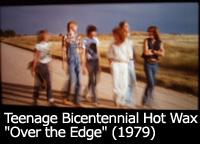 naturalistic,
teenage POV, equal parts vulnerability and volatility, culminating
in a "Lord of the Flies" youth riot - made it undistributable.
It's a picture that died a swift theatrical death, but was
resurrected by cinema heads in New York City. It's been a
known quantity ever since. naturalistic,
teenage POV, equal parts vulnerability and volatility, culminating
in a "Lord of the Flies" youth riot - made it undistributable.
It's a picture that died a swift theatrical death, but was
resurrected by cinema heads in New York City. It's been a
known quantity ever since.
Matt Dillon and his two co-stars, everyman kid Michael Eric
Kramer and junior cherry-bomb Pamela Ludwig, were each drawn
from auditions of teen actors. But the rest of the cast was
drafted from the schools, reform schools, and special schools
of 1976 Colorado.
"I was used to New York," Dillon said, "but
these Western kids, I don't know, man. They were wild."
Matt recalled going to the casting call, and seeing some of
the kids from "Bad News  Bears"
trying out. "I'll never get it," he thought, "these
other kids are too big." OK, so they didn't use Jackie
Earle Haley of "Bad News Bears," but its Juvenile
Delinquent Verité proves to be the movie's major virtue,
prefiguring "Bad Boys" (1983), "Kids"
(1995) and "Gummo" (1999). Bears"
trying out. "I'll never get it," he thought, "these
other kids are too big." OK, so they didn't use Jackie
Earle Haley of "Bad News Bears," but its Juvenile
Delinquent Verité proves to be the movie's major virtue,
prefiguring "Bad Boys" (1983), "Kids"
(1995) and "Gummo" (1999).
So you have the planned community and its radioactive desolation.
You have the feathered hair. You have the white underclass
trying to pass for middle class; the rec center with the kid-friendly
liberal in charge. You have the frustrated local cop. You
have the lanky, tow-headed stoner and his little brother the
mute New Wave skate-punk. You have the runaways 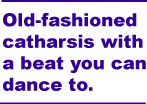 shooting
pellet guns at police cars from the highway bridge. You have
confused, scared, uptight suburban parents; headphone overtures
courtesy of Cheap Trick ("Momma's alright, Daddy's alright,
they're just a little weeeird"). You crash a blockbuster
basement party featuring '70s delinquents in their natural,
wastoid 8-track habitat. You got tripping in school during
anti-vandalism public service movies; running away from home
and living in a sleeping bag inside an abandoned half-built
condo unit; getting beat up by teenage toughs; stealing a
gun from an unlocked condo; using it to threaten kids who
"rat on other kids". shooting
pellet guns at police cars from the highway bridge. You have
confused, scared, uptight suburban parents; headphone overtures
courtesy of Cheap Trick ("Momma's alright, Daddy's alright,
they're just a little weeeird"). You crash a blockbuster
basement party featuring '70s delinquents in their natural,
wastoid 8-track habitat. You got tripping in school during
anti-vandalism public service movies; running away from home
and living in a sleeping bag inside an abandoned half-built
condo unit; getting beat up by teenage toughs; stealing a
gun from an unlocked condo; using it to threaten kids who
"rat on other kids".
Everything culminates in the Parent-Teacher meeting inside
the school and I'll let you check out the rest for yourself.
We call it good,  old-fashioned
catharsis with a beat you can dance to, and as Carl is carted
off to youth detention, it even delivers a sound lesson about
crime and punishment. old-fashioned
catharsis with a beat you can dance to, and as Carl is carted
off to youth detention, it even delivers a sound lesson about
crime and punishment.
A big "Billy Jack" fist in the air to "Over
the Edge" with Matt Dillon and Tim Hunter in person.
Along with Tarantino-touchstone "Rolling Thunder"
(1977), followed by director John Flynn and writer Heywood
Gould in person, this was the Cinematheque-Seventies screening
of the year.
|
IN PRAISE OF
Carroll Baker
in Person
with "The Carpetbaggers" (1964)
I'm happy to report this picture was a big, stroppy, "adult
entertainment" scenery-chewer in the tradition of "The
Bad and the 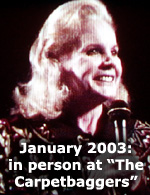 Beautiful,"
with George Peppard as a Howard Hughes-type dynamo cad. Harold
Robbins wasn't so far off the mark, though he neglected to
predict the Barcalounger and the injectable codeine. Still,
it's trash with class, courtesy a good cast, righteous Elmer
Bernstein score, and the arch momentum applied by director
Edward Dmytryk (famed of Blacklist and Film Noir). Beautiful,"
with George Peppard as a Howard Hughes-type dynamo cad. Harold
Robbins wasn't so far off the mark, though he neglected to
predict the Barcalounger and the injectable codeine. Still,
it's trash with class, courtesy a good cast, righteous Elmer
Bernstein score, and the arch momentum applied by director
Edward Dmytryk (famed of Blacklist and Film Noir).
Jonas: What do you want to see on your honeymoon?
Monica (kissing him): Lots of beautiful ceilings.
Carroll Baker enjoyed seeing the picture again. She pointed
out Dmytryk  was
generous in allowing characters to exist in long shots while
the trend even then was to crash into the close-up as soon
as possible. was
generous in allowing characters to exist in long shots while
the trend even then was to crash into the close-up as soon
as possible.
But back to the Trash. Future "A-Team" commander
George Peppard does a lot of sleazy pimping in this movie
and it still goes over great. He betrays his  mentor,
played by Alan Ladd. He rips off his sexy step-mom's clothes
and behaves like a sociopath, echoes of "The Conqueror." mentor,
played by Alan Ladd. He rips off his sexy step-mom's clothes
and behaves like a sociopath, echoes of "The Conqueror."
Carroll laughs about such then-provocative moments, saying,
"At the time there was so much deliberation doing anything
racy - should I do it, should I not do it? I see those scenes
now and I think, that's great! I'm glad I went for it."
It's all part of the Carroll Baker arc from whole cream-wholesome
(19 years old on "What's My Line?" in 1950) to precocious
method girl (Kazan's "Baby  Doll"
in 1956) to indie producer (she hired Aaron Copland to score
her production of "Something Wild" in 1961) to sex
symbol bio-pics ("Harlow" in 1965 with Leslie Nielson
swapped in for Peppard as horny megalomaniac) to the Bob Hope
Vietnam Christmas Show in 1966, to the eye-popping denouement:
Carroll Baker's designer Italian soft-core phase, in the late
'60s, but of course. Doll"
in 1956) to indie producer (she hired Aaron Copland to score
her production of "Something Wild" in 1961) to sex
symbol bio-pics ("Harlow" in 1965 with Leslie Nielson
swapped in for Peppard as horny megalomaniac) to the Bob Hope
Vietnam Christmas Show in 1966, to the eye-popping denouement:
Carroll Baker's designer Italian soft-core phase, in the late
'60s, but of course.
"Paranoid" (1969) played recently - they were definitely
onto something, the Romans, with their flashy genre trash
and their weird Euro-rock, trippy cutting and tasteful insistence
 on
Carroll doing scenes in see-through macrame. And naturally,
I respect any American who flees to Rome for their sanity.
She's been back in L.A. working for 20 years, but those '60s
films? Psychotronic gold - they don't fake the funk at Cinematheque. on
Carroll doing scenes in see-through macrame. And naturally,
I respect any American who flees to Rome for their sanity.
She's been back in L.A. working for 20 years, but those '60s
films? Psychotronic gold - they don't fake the funk at Cinematheque.
And the best part is, "Carpetbaggers" came in just
under the wire, because in 1966 one melodrama movie cad and
his wheeling-dealing and womanizing would go too far, way
too far - so far that the whiz-bang adult  drama
crashed through the looking glass into accidental comedy.
It was a monumental stinker called "The Oscar,"
with Stephen Boyd (Masala in "Ben Hur") in pole
position alongside the new-fangled "Mad, Mad World"
craze of a hundred star cameos, plus Tony Bennett as "Hymie
Kelly." Carroll Baker wasn't in it - Eleanor Parker and
Jill St. John have the distinction. But would anyone object
if I pitch a double feature of "Carpetbaggers" and
"Oscar" as the good cop, bad cop of the Great Man
Melodrama? drama
crashed through the looking glass into accidental comedy.
It was a monumental stinker called "The Oscar,"
with Stephen Boyd (Masala in "Ben Hur") in pole
position alongside the new-fangled "Mad, Mad World"
craze of a hundred star cameos, plus Tony Bennett as "Hymie
Kelly." Carroll Baker wasn't in it - Eleanor Parker and
Jill St. John have the distinction. But would anyone object
if I pitch a double feature of "Carpetbaggers" and
"Oscar" as the good cop, bad cop of the Great Man
Melodrama?
Given her liberal convictions, at the very least we must
discuss the urgency of reviving Carroll Baker's other Italian
titles like "Orgasmo" (1968) or "L'Harem"
(1968) or "Il Dolce corpo di Deborah" (1969)
- The Sweet Body of Deborah - or at the very least, "Cosí
dolce...cosí perversa" (1969) - So Sweet,
So Perverse.
Honestly, that's all we're asking for onscreen. We're not hard
to please. Just someone fabulous like Carroll Baker to make
you stand back and say, "Cosí dolce...cosí
perversa." |
CINEMA TELEPATHY & TIME-TRAVEL
MORE CINEMATHEQUE HIGHLIGHTS
"Bon Cinema."
That's what it's all about. The phrase shot over the Atlantic
and to our attention when my fellow film nerd Cisco inquired
with the French experts by email about his latest resident
obsession: the Cinema of Jean Gabin, best known as Pepe le
Moko and star of Renoir's "Grand Illusion." The
Gaullic  cinephiles
were psyched someone in L.A. was asking about the Spencer
Tracy of France, the A-1 official bar-none Coolest Guy in
the World. So in the close of their email correspondence,
our man in Paris wished Cisco: "Bon Cinema." That's
when it hit us. That's exactly what we're advocating. "Bon
Cinema." Look for the Jean Gabin round-up next issue,
formidable. cinephiles
were psyched someone in L.A. was asking about the Spencer
Tracy of France, the A-1 official bar-none Coolest Guy in
the World. So in the close of their email correspondence,
our man in Paris wished Cisco: "Bon Cinema." That's
when it hit us. That's exactly what we're advocating. "Bon
Cinema." Look for the Jean Gabin round-up next issue,
formidable.
Meanwhile, early 2003 at the Egyptian has been quality all
over the map. The Egyptian lit up in tribute to Ascended Master
Sam Fuller with screenings of "Park Row" and "House
of Bamboo." There was also the complimentary screening
of "Play Dirty," starring Michael Caine, to honor
Andre de Toth - plus Alan Arkin in person with comedy classic
"The In-Laws."
Then there was the always-rousing Technicolor Fest, featuring
the Omega Man himself, Charlton Heston in person  to
view the adventures of sexy Moses foiling sexy heathens Yul
Brynner and Anne Baxter - Mr. DeMille's Masterpiece, the Greatest
Film of the 1950s. Ten-Comm at the Egyptian with Heston -
how much more "Hollywood" can you stand it? to
view the adventures of sexy Moses foiling sexy heathens Yul
Brynner and Anne Baxter - Mr. DeMille's Masterpiece, the Greatest
Film of the 1950s. Ten-Comm at the Egyptian with Heston -
how much more "Hollywood" can you stand it?
Technicolor Fest also featured classic Sean Connery Bond,
big screen Elvis, some vintage Peter Sellers, Brit super-duo
Powell & Pressburger, Brit super-duo Alfred Hitchcock,
swashbuckling by Tyrone Power, Brando's "One-Eyed Jacks"
(a great Scope print) and crowd-pleaser "The African
Queen."
It's all served up for you on a screen the size of a 18-wheeler
for $9 ($6 for members). Not-for-profit cinema. Featuring
the most deluxe commercial spectacles, blockbusters and flops
of all time. Programmed for the delight and instruction of
humanity. Uncanny.
Then there's all the event screenings with the hot titles
for this year: "Chicago" with director Rob Marshall
 in
person, "The Hours" with Nicole Kidman in person,
ditto Diane Lane ("Unfaithful"), George Clooney
("Confessions of a Dangerous Mind"), and the Julianne
Moore In Person Tribute. in
person, "The Hours" with Nicole Kidman in person,
ditto Diane Lane ("Unfaithful"), George Clooney
("Confessions of a Dangerous Mind"), and the Julianne
Moore In Person Tribute.
You had Robert Evans in person with "The Godfather,"
"Chinatown," "Marathon Man." Robin Williams
with "One Hour Photo," Ray Liotta with "Narc,"
the Christopher Walken In Person Tribute, ditto Nic Cage,
adventure effects all-star Ray Harryhausen in person! Not
too shabby.
It's always a good sign when the year begins with a big-ass
Sergio Leone Festival. You can count 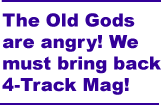 on
the Eastwood westerns, and maybe more important right now,
the resurrection of Leone's first film, "Colossus of
Rhodes," starring Rory Calhoun, shot in "SUPERTOTALSCOPE,"
a rare wonder of cool Italian genre know-how. on
the Eastwood westerns, and maybe more important right now,
the resurrection of Leone's first film, "Colossus of
Rhodes," starring Rory Calhoun, shot in "SUPERTOTALSCOPE,"
a rare wonder of cool Italian genre know-how.
Don't forget the 4-Track Mag Fest showing off the lush sights
and sounds of Preminger's "Porgy & Bess," Fosse's
"Sweet Charity," climaxing in an evening of "Paint
Your Wagon" as a 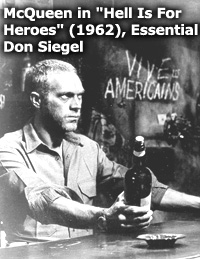 prelude
to John Wayne in Howard Hughes' "The Conqueror"!
The Old Gods are angry! We must bring back 4-Track Mag! prelude
to John Wayne in Howard Hughes' "The Conqueror"!
The Old Gods are angry! We must bring back 4-Track Mag!
There was some Steve McQueen action that dependably kicked
major ass: "Magnificent Seven," "Papillon,"
"Bullitt," "Great Escape," "Getaway"
- a schedule packed chock full of McQueen gold, especially
the Don Siegel rarity "Hell Is for Heroes," co-starring
James Coburn ad Bob Newhart in a combat ensemble that didn't
sugar-coat your warfare for you.
October hosted the George Ratliff documentary "Hell
House" (see this  issue's
interview), plus the Egyptian's 80th birthday was celebrated
with the original grand opening title: "Robin Hood"
(1922) with Douglas Fairbanks, Sr. issue's
interview), plus the Egyptian's 80th birthday was celebrated
with the original grand opening title: "Robin Hood"
(1922) with Douglas Fairbanks, Sr.
That was the night special guest Joseph Newman recounted
how he attended the grand opening night 80 years prior, as
a boy scout performing in the stage prologue. I love a guy
who can tell you about his first day of work at MGM - in 1925!
You say you crave a bitchin' 70 millimeter festival? How
about Peter O'Toole rarity "Lord Jim," along with
"2001," "Patton" and "Hello Dolly"?
Like Benny Hill used to say, "I like 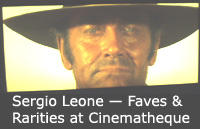 'em
big." And while we're in London, you already read about
Val Guest & Yolande Donlan in the last Five-O. That tribute
featured Val's great '50s and '60s British flicks across all
genres: "Expresso Bongo," "Jigsaw," (both
starring Yolande), and "The Day The Earth Caught Fire." 'em
big." And while we're in London, you already read about
Val Guest & Yolande Donlan in the last Five-O. That tribute
featured Val's great '50s and '60s British flicks across all
genres: "Expresso Bongo," "Jigsaw," (both
starring Yolande), and "The Day The Earth Caught Fire."
The Herzog Tribute? The best. Awesome, ultimate. Last issue
we also covered Werner's misbehavior on the Amazon with Best
Fiend Klaus Kinski. Riveting.
Summer approaching? That's the time to be ready for the Sci-Fi,
Animé, Fantasy & Horror Festival - last year ranging
from "Jaws" and "Carrie" to "The
Car" and psychotronic Brit rediscovery "Blood on
Satan's Claw" (and let's not forget Carroll Baker in
"Paranoid").
The other summer ritual to prepare for is the trusty, tried
and true Mods & Rockers Festival. Anglo-cinephiles, you
have reached your Avalon of trash and treasure: "The
Buttercup Chain," "The Italian Job," "Alfie,"
"The Magic Christian," "Wonderwall," "Tommy,"
"Darling," "The Ipcress File,"  "Billion
Dollar Brain," "The Song Remains the Same."
The sun never sets on the rocking mod movies of these guitar-happy
redcoats! "Billion
Dollar Brain," "The Song Remains the Same."
The sun never sets on the rocking mod movies of these guitar-happy
redcoats!
For those who enjoyed Chris D.'s Tribute to Japanese Action
Stars Raizo Ichikawa & Shintaro Katsu, he's the man, along
with Dennis B. and David Schultz, directing operations on the
yearly Japanese Outlaw Master festival, again for the benefit
and instruction of all mankind. It's a bona fide education
on Japanese Action Cinema from the '60s through today, courtesy
of Seijun Suzuki, Kinji Fukasaku, Takashi Miike and Kon Ichikawa,
with titles including "Black Rose Mansion," "Pistol
Opera," "Female Convict Scorpion - Jailhouse 41"
and "Black Tight Killers."
June 2002 also hosted The Haunted World of Mario Bava, featuring
his son Lamberto and producer Alfredo Leone in person, and
a screening of his lost last film "Kidnapped." For
me the moment of truth was Bava's debut feature and formal
masterpiece, "Black Sunday," with Barbara Steele
in person! Don't forget genre uber-movie "Twitch of the
Death Nerve," which single-handedly coined the Slasher
Genre and pre-emptively spoofed itself. You had to dig "Lisa
and the Devil" with 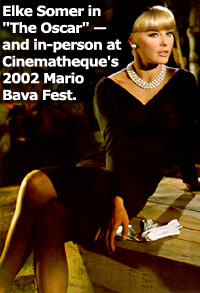 Elke
Somers in person, bearing tales of sinister co-star Telly
Savalas. Then there was "The Girl Who Knew Too Much"
with mighty John Saxon in person to testify to the magic of
Rome in the '60s. Audience favorites included "Planet
of the Vampires" and "Hercules in the Haunted World"
- Bava-vision: to this we say, Bravo, Encore! Elke
Somers in person, bearing tales of sinister co-star Telly
Savalas. Then there was "The Girl Who Knew Too Much"
with mighty John Saxon in person to testify to the magic of
Rome in the '60s. Audience favorites included "Planet
of the Vampires" and "Hercules in the Haunted World"
- Bava-vision: to this we say, Bravo, Encore!
In May, Dennis saluted the late Bud Boetticher with excellent
prints of his famed Randolph Scott Westerns: "7 Men from
Now," "The Tall T," and "Ride Lonesome"
(James Coburn's debut feature). "The Bullfighter and
the Lady," with Robert Stack in person,  was
Bud's most personal effort: a big disappointment, we learned,
because of a painful recut by Boetticher mentor John Ford.
Ouch! was
Bud's most personal effort: a big disappointment, we learned,
because of a painful recut by Boetticher mentor John Ford.
Ouch!
If this wasn't enough, the Bava and Boetticher were preceded
for the awe-inspiring Powell & Pressburger Festival: "Black
Narcissus," "The Red Shoes," "Peeping
Tom" - Good God, what bon cinema they have here on Hollywood
Boulevard.
Like Gloria Stuart in April, as mentioned, hosting two Universal
horror classics: "Invisible Man" and "The Old
Dark House." That's only a few nights after a run of
John Woo in person and the crime film ritual called Film Noir
Fest #4.
Last February puts us back near where we started: Technicolor
Dreams Fest, with sumptuous titles like "Forever Amber"
and "Blood and Sand." War movie fans got to ride
"Blackhawk Down" with Ridley Scott and Jerry Bruckheimer
in person. There was the  Patrick MacNee 80th Birthday screenings (chilling
with the original John Steed!), and in January of 2002, "Mothman Prophecies"
with director Mark Pellington, and before that, the Kubrick
Retrospective with producer James B. Harris and actor Malcolm
McDowell. 2002 began with Sean Penn in person with "Carlito's
Way," "The Pledge," "At Close Range,"
"Sweet and Lowdown," good stuff in the way of screen
acting and hilarious and weird Q&As.
Patrick MacNee 80th Birthday screenings (chilling
with the original John Steed!), and in January of 2002, "Mothman Prophecies"
with director Mark Pellington, and before that, the Kubrick
Retrospective with producer James B. Harris and actor Malcolm
McDowell. 2002 began with Sean Penn in person with "Carlito's
Way," "The Pledge," "At Close Range,"
"Sweet and Lowdown," good stuff in the way of screen
acting and hilarious and weird Q&As.
Mind you, there's also the Annual Festival of Recent Spanish
Cinema, one of Cinematheque's landmark traditions, as well
as new Irish Cinema and Icelandic Cinema, Slamdance contenders,
new documentaries and shorts. It's a boggling list, so pick
your specialties and make that espresso a double.
Film nerds, cinema scholars and wanderers of the boulevard,
let us now give thanks for the Cinematheque. In the spirit
of the great lost library of  Alexandria,
this is the place for telepathy, time travel and rare masterworks.
Join the Cult of the Argon Ray. Drink the Film Nerd Kool-Aid.
Join up with a Dual Membership. Screen the greatest hits and
misses of all time. It's film school for under $10 a night. Alexandria,
this is the place for telepathy, time travel and rare masterworks.
Join the Cult of the Argon Ray. Drink the Film Nerd Kool-Aid.
Join up with a Dual Membership. Screen the greatest hits and
misses of all time. It's film school for under $10 a night.
Nate Nichols
|
 |
 |
|
 |
| © 2003 Hollywood Five-O,
Inc. All Rights Reserved. |
|
|
|
|
|































 time
the special engagement wasn't for an evening. It was for life,
as American Cinematheque programmer Dennis Bartok married
producer Susan Gold in a creative, unconventional ceremony
that captured the couple's unique, heart-felt chemistry.
time
the special engagement wasn't for an evening. It was for life,
as American Cinematheque programmer Dennis Bartok married
producer Susan Gold in a creative, unconventional ceremony
that captured the couple's unique, heart-felt chemistry.  producer
is matched only by her prowess in Iron Man triathlons and
yoga performed at 105 degrees.
producer
is matched only by her prowess in Iron Man triathlons and
yoga performed at 105 degrees.  Strip?
As Dennis entered the restaurant a glimmer of light caught
his eye. There was Susan wearing a princess tiara. But Dennis,
a self-described old movie nerd, did not impress Susan, who
Strip?
As Dennis entered the restaurant a glimmer of light caught
his eye. There was Susan wearing a princess tiara. But Dennis,
a self-described old movie nerd, did not impress Susan, who
 thought
he was a Hollywood hipster and definitely not her type. Not
her type, that is, until she got him to give an interview
for AMC, the cable channel where she worked. Then the tide
changed.
thought
he was a Hollywood hipster and definitely not her type. Not
her type, that is, until she got him to give an interview
for AMC, the cable channel where she worked. Then the tide
changed. golden
curls. She wore a graceful long silk lehnga and top with gold
embroidery and over-the-shoulder train. Her wedding dress
was the creation of her friend, designer Denise Wingate. Susan
also carried a bouquet of white hydrangeas.
golden
curls. She wore a graceful long silk lehnga and top with gold
embroidery and over-the-shoulder train. Her wedding dress
was the creation of her friend, designer Denise Wingate. Susan
also carried a bouquet of white hydrangeas. sang
"Fields of Gold" a cappella. The matchmaker Melissa
Smith read a poem and caught the bouquet. Concert violinist
Brooke Wharton played Ravel's "Pavanne for a Dead Princess."
During the ceremony Susan remembered: Terri Parris her college
friend; her grandparents Fredrick Arthur Grosse and Nancy
Dootile Grosse; Alexander Joseph and Ida Nemeth Berkes; and
her dog Robey. Dennis remembered his mother Leann
sang
"Fields of Gold" a cappella. The matchmaker Melissa
Smith read a poem and caught the bouquet. Concert violinist
Brooke Wharton played Ravel's "Pavanne for a Dead Princess."
During the ceremony Susan remembered: Terri Parris her college
friend; her grandparents Fredrick Arthur Grosse and Nancy
Dootile Grosse; Alexander Joseph and Ida Nemeth Berkes; and
her dog Robey. Dennis remembered his mother Leann  Bartok
and his grandparents Margaret and Joseph Bartok. He gave a
special thanks to Budd and Mary Boetticher and Joe Massot.
The wedding vows, spoken with warmth and passion, were written
by the bride and groom for each other. Eddie Muller, having
received his marrying credential over the Internet, pronounced
the couple husband and wife.
Bartok
and his grandparents Margaret and Joseph Bartok. He gave a
special thanks to Budd and Mary Boetticher and Joe Massot.
The wedding vows, spoken with warmth and passion, were written
by the bride and groom for each other. Eddie Muller, having
received his marrying credential over the Internet, pronounced
the couple husband and wife.  up
lunch. The beautiful decorations of hydrangeas and pomegranates
were well matched by the colorful slip dresses worn by many
of the ladies present. Also attending were a few dogs and
babies keeping the celebration lively. It must not be forgotten
that Thai Elvis made a surprise appearance, singing three
up
lunch. The beautiful decorations of hydrangeas and pomegranates
were well matched by the colorful slip dresses worn by many
of the ladies present. Also attending were a few dogs and
babies keeping the celebration lively. It must not be forgotten
that Thai Elvis made a surprise appearance, singing three
 selections
from the film "Blue Hawaii." And following the reception
a special screening of Richard Fleischer's uplifting family
film "The Happy Time" (1952) was presented.
selections
from the film "Blue Hawaii." And following the reception
a special screening of Richard Fleischer's uplifting family
film "The Happy Time" (1952) was presented. celebrity
Ann Savage, world record swimmer Bob Strand, world class duathlete
Gerard Degan, and the new "Terminator" girl, Kristanna
Loken. Also present were: Max Rosenberg, producer of "Dr.
Terror's House of Horrors," distributor Harry Novak ("Mantis
in Lace"), actors Frederic Forrest ("Apocalypse
Now") and Nicky Katt ("Boston Public"), cinematographer
celebrity
Ann Savage, world record swimmer Bob Strand, world class duathlete
Gerard Degan, and the new "Terminator" girl, Kristanna
Loken. Also present were: Max Rosenberg, producer of "Dr.
Terror's House of Horrors," distributor Harry Novak ("Mantis
in Lace"), actors Frederic Forrest ("Apocalypse
Now") and Nicky Katt ("Boston Public"), cinematographer
 Patrick
Steward, and film critic Leonard Maltin. A distinguished list
of directors was in force at this wedding, including Richard
Fleisher, Werner Herzog, Curtis Harrington, Monte Hellman,
Joe Dante, Adam Rifkin and Val Guest.
Patrick
Steward, and film critic Leonard Maltin. A distinguished list
of directors was in force at this wedding, including Richard
Fleisher, Werner Herzog, Curtis Harrington, Monte Hellman,
Joe Dante, Adam Rifkin and Val Guest.
 his
home in Burbank on Sunday, October 27th - just a few blocks
from Warner Bros. Studios, where Andre made some of his best
known films, including HOUSE OF WAX, SPRINGFIELD RIFLE and
CRIMEWAVE (and where Andre's
his
home in Burbank on Sunday, October 27th - just a few blocks
from Warner Bros. Studios, where Andre made some of his best
known films, including HOUSE OF WAX, SPRINGFIELD RIFLE and
CRIMEWAVE (and where Andre's  wife
Ann worked for many years as Executive Assistant to former
Warner Bros.' CEO Robert Daley.)
wife
Ann worked for many years as Executive Assistant to former
Warner Bros.' CEO Robert Daley.)  immigrating
to the U.S., where he kick-started his career by directing
one of the first (and most prescient) movies about the menace
of Nazism, NONE SHALL ESCAPE in 1944. To the end of his life
Andre was immensely proud of the fact that he had sounded
the alarm bells about the Nazi death camps before almost anyone
else in Hollywood.
immigrating
to the U.S., where he kick-started his career by directing
one of the first (and most prescient) movies about the menace
of Nazism, NONE SHALL ESCAPE in 1944. To the end of his life
Andre was immensely proud of the fact that he had sounded
the alarm bells about the Nazi death camps before almost anyone
else in Hollywood.  drug
addiction (MONKEY ON MY BACK), spiritual and physical violence
(DAY OF THE OUTLAW), the sheer insanity of war (PLAY DIRTY),
without ever talking down to his audience, or attempting to
sugarcoat the painful reality of the subject at hand.
drug
addiction (MONKEY ON MY BACK), spiritual and physical violence
(DAY OF THE OUTLAW), the sheer insanity of war (PLAY DIRTY),
without ever talking down to his audience, or attempting to
sugarcoat the painful reality of the subject at hand. ear,
"Remember, whatever I say, I'm your friend." It
was that sense of humor, coupled with a natural camera-eye
and his pared-to-the-bone instincts, that earned him the admiration
of directors like Martin Scorsese, Bertrand Tavernier and
Curtis Hanson, film scholars like Todd McCarthy and Anthony
Slide (who co-authored Andre's wonderful book "De Toth
On De Toth"), and film programmers like Andre's dear
friend Thierry Fremaux of the Institut Lumiere in Lyons, France.
ear,
"Remember, whatever I say, I'm your friend." It
was that sense of humor, coupled with a natural camera-eye
and his pared-to-the-bone instincts, that earned him the admiration
of directors like Martin Scorsese, Bertrand Tavernier and
Curtis Hanson, film scholars like Todd McCarthy and Anthony
Slide (who co-authored Andre's wonderful book "De Toth
On De Toth"), and film programmers like Andre's dear
friend Thierry Fremaux of the Institut Lumiere in Lyons, France.
 For
those who love movies, Andre was the real thing, a director's
director, the last of a rare breed of Old World craftsmen
and artists.
For
those who love movies, Andre was the real thing, a director's
director, the last of a rare breed of Old World craftsmen
and artists.  what
you're supposed to be lining up for when you could have cult
films, films with their own unique legend - and check out
the incredible web of associations on this bad boy. The warning
came to me in the form of an email from Cisco, the Laurel
Canyon Kid:
what
you're supposed to be lining up for when you could have cult
films, films with their own unique legend - and check out
the incredible web of associations on this bad boy. The warning
came to me in the form of an email from Cisco, the Laurel
Canyon Kid: best
soundtracks of all time. Featuring lanky junior high school
stoners who look like real lanky junior high school stoners.
Excellent cinematography. Great Cheap Trick/Van Halen soundtrack.
Corrupt parents, adults, and community leaders (including
"Officer Doberman"). Weed ("420") aplenty.
And a junior high school burning to the ground like Post Toasties.
best
soundtracks of all time. Featuring lanky junior high school
stoners who look like real lanky junior high school stoners.
Excellent cinematography. Great Cheap Trick/Van Halen soundtrack.
Corrupt parents, adults, and community leaders (including
"Officer Doberman"). Weed ("420") aplenty.
And a junior high school burning to the ground like Post Toasties. Jennifer
Jason Leigh and VIP novelist Hubert Selby, Jr. in person ("Last
Exit to Brooklyn" screened after the Q&A). And of
course Cinematheque gets the bronze too. Let's just pick one:
OK, Gloria Stuart, 92 sparkling years young, in person with
two of her best, "The Invisible Man" (1933) and
"The Old Dark House" (1932).
Jennifer
Jason Leigh and VIP novelist Hubert Selby, Jr. in person ("Last
Exit to Brooklyn" screened after the Q&A). And of
course Cinematheque gets the bronze too. Let's just pick one:
OK, Gloria Stuart, 92 sparkling years young, in person with
two of her best, "The Invisible Man" (1933) and
"The Old Dark House" (1932).  Noir
Fest faves "The Burglar" (1958) with Dan Duryea
and Jayne Mansfield, AND Joe Newman's immortal noir classic
starring Edmond O'Brien, "711 Ocean Drive" (1950).
Fans of Marilyn Monroe's first runaway hit, "Niagara"
(1953), will also recognize Kaplan's lush swells.
Noir
Fest faves "The Burglar" (1958) with Dan Duryea
and Jayne Mansfield, AND Joe Newman's immortal noir classic
starring Edmond O'Brien, "711 Ocean Drive" (1950).
Fans of Marilyn Monroe's first runaway hit, "Niagara"
(1953), will also recognize Kaplan's lush swells. Scorsese
at NYU and got his start in features with a Roger Corman number
called "Night Call Nurses" (1972). He then directed
two popular hits on either side of the color line: Isaac Hayes
as "Truck Turner" (1974) and Jan Michael Vincent
in "White Line Fever" (1975).
Scorsese
at NYU and got his start in features with a Roger Corman number
called "Night Call Nurses" (1972). He then directed
two popular hits on either side of the color line: Isaac Hayes
as "Truck Turner" (1974) and Jan Michael Vincent
in "White Line Fever" (1975). seems
Ian McLellan Hunter wrote "The Amazing Mr. X" a.k.a.
"The Spiritualist" (1948), which brought down the
house a couple years ago at Noir Fest with Turhan Bey in person.
As for Tim's mother, Aileen, she wrote "Christmas in
Connecticut," starring Barbara Stanwyck. And "River's
Edge," the film regarded as Tim Hunter's masterpiece,
launched Keanu Reeves, Ione Skye and Crispin Glover in 1986.
seems
Ian McLellan Hunter wrote "The Amazing Mr. X" a.k.a.
"The Spiritualist" (1948), which brought down the
house a couple years ago at Noir Fest with Turhan Bey in person.
As for Tim's mother, Aileen, she wrote "Christmas in
Connecticut," starring Barbara Stanwyck. And "River's
Edge," the film regarded as Tim Hunter's masterpiece,
launched Keanu Reeves, Ione Skye and Crispin Glover in 1986.
 naturalistic,
teenage POV, equal parts vulnerability and volatility, culminating
in a "Lord of the Flies" youth riot - made it undistributable.
It's a picture that died a swift theatrical death, but was
resurrected by cinema heads in New York City. It's been a
known quantity ever since.
naturalistic,
teenage POV, equal parts vulnerability and volatility, culminating
in a "Lord of the Flies" youth riot - made it undistributable.
It's a picture that died a swift theatrical death, but was
resurrected by cinema heads in New York City. It's been a
known quantity ever since. Bears"
trying out. "I'll never get it," he thought, "these
other kids are too big." OK, so they didn't use Jackie
Earle Haley of "Bad News Bears," but its Juvenile
Delinquent Verité proves to be the movie's major virtue,
prefiguring "Bad Boys" (1983), "Kids"
(1995) and "Gummo" (1999).
Bears"
trying out. "I'll never get it," he thought, "these
other kids are too big." OK, so they didn't use Jackie
Earle Haley of "Bad News Bears," but its Juvenile
Delinquent Verité proves to be the movie's major virtue,
prefiguring "Bad Boys" (1983), "Kids"
(1995) and "Gummo" (1999).  shooting
pellet guns at police cars from the highway bridge. You have
confused, scared, uptight suburban parents; headphone overtures
courtesy of Cheap Trick ("Momma's alright, Daddy's alright,
they're just a little weeeird"). You crash a blockbuster
basement party featuring '70s delinquents in their natural,
wastoid 8-track habitat. You got tripping in school during
anti-vandalism public service movies; running away from home
and living in a sleeping bag inside an abandoned half-built
condo unit; getting beat up by teenage toughs; stealing a
gun from an unlocked condo; using it to threaten kids who
"rat on other kids".
shooting
pellet guns at police cars from the highway bridge. You have
confused, scared, uptight suburban parents; headphone overtures
courtesy of Cheap Trick ("Momma's alright, Daddy's alright,
they're just a little weeeird"). You crash a blockbuster
basement party featuring '70s delinquents in their natural,
wastoid 8-track habitat. You got tripping in school during
anti-vandalism public service movies; running away from home
and living in a sleeping bag inside an abandoned half-built
condo unit; getting beat up by teenage toughs; stealing a
gun from an unlocked condo; using it to threaten kids who
"rat on other kids".  old-fashioned
catharsis with a beat you can dance to, and as Carl is carted
off to youth detention, it even delivers a sound lesson about
crime and punishment.
old-fashioned
catharsis with a beat you can dance to, and as Carl is carted
off to youth detention, it even delivers a sound lesson about
crime and punishment.  Beautiful,"
with George Peppard as a Howard Hughes-type dynamo cad. Harold
Robbins wasn't so far off the mark, though he neglected to
predict the Barcalounger and the injectable codeine. Still,
it's trash with class, courtesy a good cast, righteous Elmer
Bernstein score, and the arch momentum applied by director
Edward Dmytryk (famed of Blacklist and Film Noir).
Beautiful,"
with George Peppard as a Howard Hughes-type dynamo cad. Harold
Robbins wasn't so far off the mark, though he neglected to
predict the Barcalounger and the injectable codeine. Still,
it's trash with class, courtesy a good cast, righteous Elmer
Bernstein score, and the arch momentum applied by director
Edward Dmytryk (famed of Blacklist and Film Noir).  was
generous in allowing characters to exist in long shots while
the trend even then was to crash into the close-up as soon
as possible.
was
generous in allowing characters to exist in long shots while
the trend even then was to crash into the close-up as soon
as possible.  mentor,
played by Alan Ladd. He rips off his sexy step-mom's clothes
and behaves like a sociopath, echoes of "The Conqueror."
mentor,
played by Alan Ladd. He rips off his sexy step-mom's clothes
and behaves like a sociopath, echoes of "The Conqueror."
 Doll"
in 1956) to indie producer (she hired Aaron Copland to score
her production of "Something Wild" in 1961) to sex
symbol bio-pics ("Harlow" in 1965 with Leslie Nielson
swapped in for Peppard as horny megalomaniac) to the Bob Hope
Vietnam Christmas Show in 1966, to the eye-popping denouement:
Carroll Baker's designer Italian soft-core phase, in the late
'60s, but of course.
Doll"
in 1956) to indie producer (she hired Aaron Copland to score
her production of "Something Wild" in 1961) to sex
symbol bio-pics ("Harlow" in 1965 with Leslie Nielson
swapped in for Peppard as horny megalomaniac) to the Bob Hope
Vietnam Christmas Show in 1966, to the eye-popping denouement:
Carroll Baker's designer Italian soft-core phase, in the late
'60s, but of course.  on
Carroll doing scenes in see-through macrame. And naturally,
I respect any American who flees to Rome for their sanity.
She's been back in L.A. working for 20 years, but those '60s
films? Psychotronic gold - they don't fake the funk at Cinematheque.
on
Carroll doing scenes in see-through macrame. And naturally,
I respect any American who flees to Rome for their sanity.
She's been back in L.A. working for 20 years, but those '60s
films? Psychotronic gold - they don't fake the funk at Cinematheque. drama
crashed through the looking glass into accidental comedy.
It was a monumental stinker called "The Oscar,"
with Stephen Boyd (Masala in "Ben Hur") in pole
position alongside the new-fangled "Mad, Mad World"
craze of a hundred star cameos, plus Tony Bennett as "Hymie
Kelly." Carroll Baker wasn't in it - Eleanor Parker and
Jill St. John have the distinction. But would anyone object
if I pitch a double feature of "Carpetbaggers" and
"Oscar" as the good cop, bad cop of the Great Man
Melodrama?
drama
crashed through the looking glass into accidental comedy.
It was a monumental stinker called "The Oscar,"
with Stephen Boyd (Masala in "Ben Hur") in pole
position alongside the new-fangled "Mad, Mad World"
craze of a hundred star cameos, plus Tony Bennett as "Hymie
Kelly." Carroll Baker wasn't in it - Eleanor Parker and
Jill St. John have the distinction. But would anyone object
if I pitch a double feature of "Carpetbaggers" and
"Oscar" as the good cop, bad cop of the Great Man
Melodrama? cinephiles
were psyched someone in L.A. was asking about the Spencer
Tracy of France, the A-1 official bar-none Coolest Guy in
the World. So in the close of their email correspondence,
our man in Paris wished Cisco: "Bon Cinema." That's
when it hit us. That's exactly what we're advocating. "Bon
Cinema." Look for the Jean Gabin round-up next issue,
formidable.
cinephiles
were psyched someone in L.A. was asking about the Spencer
Tracy of France, the A-1 official bar-none Coolest Guy in
the World. So in the close of their email correspondence,
our man in Paris wished Cisco: "Bon Cinema." That's
when it hit us. That's exactly what we're advocating. "Bon
Cinema." Look for the Jean Gabin round-up next issue,
formidable. to
view the adventures of sexy Moses foiling sexy heathens Yul
Brynner and Anne Baxter - Mr. DeMille's Masterpiece, the Greatest
Film of the 1950s. Ten-Comm at the Egyptian with Heston -
how much more "Hollywood" can you stand it?
to
view the adventures of sexy Moses foiling sexy heathens Yul
Brynner and Anne Baxter - Mr. DeMille's Masterpiece, the Greatest
Film of the 1950s. Ten-Comm at the Egyptian with Heston -
how much more "Hollywood" can you stand it? in
person, "The Hours" with Nicole Kidman in person,
ditto Diane Lane ("Unfaithful"), George Clooney
("Confessions of a Dangerous Mind"), and the Julianne
Moore In Person Tribute.
in
person, "The Hours" with Nicole Kidman in person,
ditto Diane Lane ("Unfaithful"), George Clooney
("Confessions of a Dangerous Mind"), and the Julianne
Moore In Person Tribute.  on
the Eastwood westerns, and maybe more important right now,
the resurrection of Leone's first film, "Colossus of
Rhodes," starring Rory Calhoun, shot in "SUPERTOTALSCOPE,"
a rare wonder of cool Italian genre know-how.
on
the Eastwood westerns, and maybe more important right now,
the resurrection of Leone's first film, "Colossus of
Rhodes," starring Rory Calhoun, shot in "SUPERTOTALSCOPE,"
a rare wonder of cool Italian genre know-how.  prelude
to John Wayne in Howard Hughes' "The Conqueror"!
The Old Gods are angry! We must bring back 4-Track Mag!
prelude
to John Wayne in Howard Hughes' "The Conqueror"!
The Old Gods are angry! We must bring back 4-Track Mag! issue's
interview), plus the Egyptian's 80th birthday was celebrated
with the original grand opening title: "Robin Hood"
(1922) with Douglas Fairbanks, Sr.
issue's
interview), plus the Egyptian's 80th birthday was celebrated
with the original grand opening title: "Robin Hood"
(1922) with Douglas Fairbanks, Sr.  'em
big." And while we're in London, you already read about
Val Guest & Yolande Donlan in the last Five-O. That tribute
featured Val's great '50s and '60s British flicks across all
genres: "Expresso Bongo," "Jigsaw," (both
starring Yolande), and "The Day The Earth Caught Fire."
'em
big." And while we're in London, you already read about
Val Guest & Yolande Donlan in the last Five-O. That tribute
featured Val's great '50s and '60s British flicks across all
genres: "Expresso Bongo," "Jigsaw," (both
starring Yolande), and "The Day The Earth Caught Fire."
 "Billion
Dollar Brain," "The Song Remains the Same."
The sun never sets on the rocking mod movies of these guitar-happy
redcoats!
"Billion
Dollar Brain," "The Song Remains the Same."
The sun never sets on the rocking mod movies of these guitar-happy
redcoats!  Elke
Somers in person, bearing tales of sinister co-star Telly
Savalas. Then there was "The Girl Who Knew Too Much"
with mighty John Saxon in person to testify to the magic of
Rome in the '60s. Audience favorites included "Planet
of the Vampires" and "Hercules in the Haunted World"
- Bava-vision: to this we say, Bravo, Encore!
Elke
Somers in person, bearing tales of sinister co-star Telly
Savalas. Then there was "The Girl Who Knew Too Much"
with mighty John Saxon in person to testify to the magic of
Rome in the '60s. Audience favorites included "Planet
of the Vampires" and "Hercules in the Haunted World"
- Bava-vision: to this we say, Bravo, Encore! was
Bud's most personal effort: a big disappointment, we learned,
because of a painful recut by Boetticher mentor John Ford.
Ouch!
was
Bud's most personal effort: a big disappointment, we learned,
because of a painful recut by Boetticher mentor John Ford.
Ouch! Patrick MacNee 80th Birthday screenings (chilling
with the original John Steed!), and in January of 2002, "Mothman Prophecies"
with director Mark Pellington, and before that, the Kubrick
Retrospective with producer James B. Harris and actor Malcolm
McDowell. 2002 began with Sean Penn in person with "Carlito's
Way," "The Pledge," "At Close Range,"
"Sweet and Lowdown," good stuff in the way of screen
acting and hilarious and weird Q&As.
Patrick MacNee 80th Birthday screenings (chilling
with the original John Steed!), and in January of 2002, "Mothman Prophecies"
with director Mark Pellington, and before that, the Kubrick
Retrospective with producer James B. Harris and actor Malcolm
McDowell. 2002 began with Sean Penn in person with "Carlito's
Way," "The Pledge," "At Close Range,"
"Sweet and Lowdown," good stuff in the way of screen
acting and hilarious and weird Q&As. Alexandria,
this is the place for telepathy, time travel and rare masterworks.
Join the Cult of the Argon Ray. Drink the Film Nerd Kool-Aid.
Join up with a Dual Membership. Screen the greatest hits and
misses of all time. It's film school for under $10 a night.
Alexandria,
this is the place for telepathy, time travel and rare masterworks.
Join the Cult of the Argon Ray. Drink the Film Nerd Kool-Aid.
Join up with a Dual Membership. Screen the greatest hits and
misses of all time. It's film school for under $10 a night.
